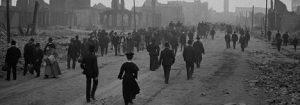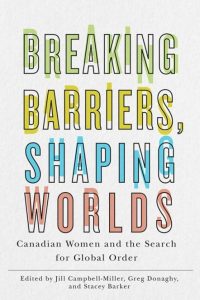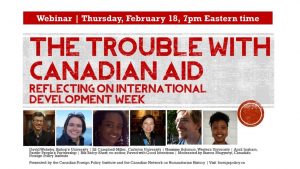The Eleventh Bulletin of the CNHH has now been sent out to the membership. If you missed it, the complete PDF of the bulletin can be found here: Bulletin of the CNHH May 2021 FINAL
It has been more than a year since the last bulletin of April 2020. We hope that you are all well and that you will continue to send news, posts and announcements.
-
I. PANEL AND ANNUAL GENERAL MEETING
The annual CNHH sponsored panel on “Making Connections with the Public: Alternative Approaches to Learning History” will take place on Monday May 31, from 11:00 to 12:15 Ottawa time, virtually. The program of the CHA virtual conference is here: https://cha-shc.ca/_uploads/6092c3d816fd7.pdf
And here are the links to register for each day of the conference: 31 may 1er juin 2 juin 3 juin
We are looking forward to watching our colleagues:
- Sophie Tellier and Julie Roy (Library and Archives Canada): “Experiential Learning Workshops for University Students: Bridging the Gap Between the Theory and Practice”
- Sonya de Laat (McMaster University): “Was It Really ‘different back then’? Reflecting on Current Global Health Ethics with an NFB Film about CUSO, 1965”
- Lydia Wytenbroek (UBC): “Teaching Medical and Nursing History with Photographs”
- Chair | Présidente (National Defence Headquarters): Isabel Campbell
The Annual meeting of the CNHH will take place at the end of the same week, on Friday June 4, from 1:00 to 2:00 Ottawa time. The agenda will include research updates, plans for the future, website update, discussion of the website, sponsored panel for 2022, and appointment of future officers. Let us know if you would like to add other points.
Here is where to register:
-
II. NEWS FROM MEMBERS
Sarah Glassford recently spoke with Dr. Samantha Cutrara about letters sent home to London from the front in 1943 and how these demonstrate the importance of emotional labour and creating networks of home for many women in the wartime Red Cross. That interview, with links to the video or audio podcast, can be found on the CNHH website.
Jill Campbell-Miller has a new article out that may be of interest to members: “The Proving Ground: Colombo Plan Fellowships and the Changing Landscape of Health Education in Canada, 1951-69,” Canadian Bulletin of Medical History 38, no 1 (2021): 1-31, https://doi.org/10.3138/cbmh.437-042020. This article examines the history of the Colombo Plan fellowship program in Canada during the 1950s and 1960s. It argues that this program had a visible impact on Canadian institutions of learning and health care.
Dominique Marshall published an article on Traditions in the Nonprofit Sector in Historical Contexts”, in Intersections and Innovations: Change in Canada’s Voluntary and Nonprofit Sector, launched in open access, May 2021. http://muttart.org/intersections She is a member of the Archives, Living Histories and Heritage Working Group of the The Local Engagement Refugee Research Network, which has just published a Report on Oral History and Refugee Project (by Federica DeSIsto). The Carleton University Disability Research Group has also prepared one exhibit on the transnational disability activism of Canadians leading to the UN Convention on People with Disability: Transnational Representation: Canada and the Founding of Disabled Peoples’ International (by Ryan Patterson) As a co-PI of the project Gendered Design in STEM she is in contact with several NGOs involved in the matter in Lower and Middle Income Countries, as the second bulletin of the project shows. Dominique also convened the 2020 Shannon Lectures in History on the theme of Human Rights in Canadian History. Recordings of the five lectures and Q&A sessions are available HERE. The topics were Migrations, Minorities, Disability, Privacy, Truth & Reconciliation, respectively.
David Webster launched a new web site and project: Has Canada promoted a unique development model? The Canadian Development History Project (CDHP) is a pilot initiative based in the Department of History and Global Studies at Bishop’s University. It aims to investigate and promote work on the history of Canadian interactions with the global South in the realm of development cooperation in ways that complement the wider work of the CNNH network, with a specific inquiry into the question of Canadian development models and development advisors and practitioners in the field. New team members are welcome – please visit the web site at devhistory.ca. His work on Timor-Leste continues. Several initiatives are under way to investigate aid history in Timor-Leste (formerly known as East Timor). A short-term call for relief efforts after the country was hit by floods – with related risk of flooding – involves emergency food to students at the National University, with assistance directed through the Association of Asian Studies. A longer-term webinar series is in the planning stages. A longer-term project is under way for targeted partnerships with two LGBTIQ+ groups in Timor-Leste, following a webinar on the topic held on March 1 (recoding available at https://www.facebook.com/watch/?v=334355481339038). The Timor International Solidarity Archive (timorachive.com) is documenting the history of international solidarity with the Timorese liberation struggle. Finally, David Webster’s book on Canada and East Timor launched in April. A recording is available in the “Recent talks” on the CNHH website.
III. WELCOME TO NEW MEMBERS
Simplice AYANGMA BONOHO, a new Banting Postdoctoral Fellow at Bishop’s University for 2021-23, whose research focus is on Canadian health care aid to francophone Africa. Dr. Ayangma Bonho holds a Ph.D in History from the University of Geneva (Switzerland) and the University of Yaoundé I (Cameroon). He is specifically interested in the history of health development policies implemented in Africa since the end of World War II. He summarized his research for the “Lightning Lecture in Environment, Health, and History” series at https://networks.h-net.org/lightning-lectures-environment-health-and-history-healthy-environment-prophylactic-measure-colonial.
His research summary: Le Canada et les politiques internationales de développement sanitaire en Afrique francophone après les indépendances (1960-1980) – Le présent projet de recherche ambitionne, à partir des outils méthodologiques de l’histoire sociale transnationale (comparaison historique et transferts de divers ordres), de mener une analyse de la manière dont le Canada a contribué au développement de la santé en Afrique francophone au lendemain des indépendances. J’insisterai de ce fait, sur les cas du Cameroun, du Sénégal et de la Tunisie, identifiés en 1969 par l’ACDI, comme pays prioritaires de l’APD canadienne. Il est en effet question, en identifiant les acteurs et les réseaux d’acteurs qui contribuent à diffuser sur le terrain les politiques internationales de santé, de cerner leur impact sur le développement sanitaire du continent africain. Il s’agit enfin, de qualifier aussi bien la singularité que l’effet de ces pratiques d’aide canadienne sur la mise en place d’appareils nationaux de santé.
Helen Kennedy, PhD Candidate, Carleton University. Helen works on 20th century conflict and genocide; humanitarian aid; international intervention; public discourse; psychological trauma; Bosnia; peacekeeping; foreign policy; displaced populations; United Nations. Email: helenkennedy@cmail.carleton.ca Website: https://carleton.ca/history/people/helen-kennedy/ Interests and Research: 20th century conflict and genocide; peacekeeping; humanitarian assistance; international intervention; United Nations; public discourse; Bosnia.
Anna Kozlova, PhD Candidate, Department of History, Carleton University. Interests: Anna’s research interests focus on migration, diaspora, oral history and transnationalism. Her MITACS-funded project “Two case studies in the public history of international development policies in Canada: the Lebanese Special Measures Program (1975-1990) and The Life of Lewis Perinbam (1925-2008)” is conducted in partnership with the Canadian Immigration Historical Society and the World University Service of Canada. This project draws on the work conducted by Helen Kennedy in her MITACS-funded project with WUSC. AnnaKozlova@cmail.carleton.ca
Hunter McGill, Senior Fellow, School of International Development and Global Studies, University of Ottawa. https://uniweb.uottawa.ca/?lang=en#!/members/1069 hunter.mcgill@uottawa.ca
Jason Philips, Independent Consultant and Researcher; Adjunct Research Professor, Norman Paterson School of International Affairs, Carleton University. Email: philipjason185@yahoo.com. Jason teaches courses on the Politics of Forced Displacement and Complex Humanitarian Emergencies. He is currently engaged in a series of research studies examining how humanitarian ethics are understood and operationalized in the aid sector. Jason is currently a member of the Humanitarian Quality Assurance Initiative’s (HQAI) General Assembly and previously served on the Board of Inside NGO (now Humentum). He holds a Ph.D. in political science from The Johns Hopkins University in Baltimore, Maryland, USA. His dissertation, “International Norms, American Foreign Policy, and African Famine,” compared US responses to crises in Nigeria/Biafra, Ethiopia, and Somalia to understand the conditions under which norm entrepreneurs are able to influence state humanitarian policy.
Elizabeth Reid, Honours Undergraduate student, Carleton University, Ottawa Email: elizabethmreid@cmail.carleton.ca. Elizabeth worked as a research assistant for the CNHH in 2020-2021. To this point in Elizabeth’s research, she has taken an interest in social and cultural history in Canada and the U.S., and the ways these histories shape and are shaped by humanitarian aid both domestically and internationally.
-
IV. ARCHIVES NEWS
The Humanitarian Archival Rescue Project in collaboration with ASC has been busy acquiring, cataloguing and advising more fonds. Chris Trainor sends news from Carleton’s Archives and Special Collections: While the pandemic has caused a considerable disruption in our usual business since approximately March 2020, we have been able to provide access to researchers when restrictions have been loosened. This has allowed us to ensure that our various collections, including materials from some of the collections related to our ‘archival rescue’ collaboration with CNHH. We are hoping that as case numbers in Ottawa decrease, we will be able to offer more access to researchers with proper health protocols in place over the summer and throughout the Fall and Winter.
Throughout the pandemic, our gifts and donations processes have been on hold because of health restrictions, but we have ensured that we continue discussions with potential donors and ensure that when restrictions lift that we can follow-up with them accordingly to complete our archival assessments.
We have also been involved in providing recommendations and opinions to various groups and individuals who have reached out for direction on what to do with their records and collections. It has been very rewarding to be able to provide this support and pass along our knowledge of preservation and maintenance of archival records so that groups and individuals can make the best possible decisions about the records they have in their possession.
After some delays due to the pandemic, we have started discussions with Jill Campbell-Miller and Dominique Marshall to work on developing webinar/workshop content to provide guidance to NGOs on managing records. We will provide more details as things progress, but ASC is very excited to be able to help with this aspect, so that records of the very important work being done is maintained and preserved in the best way possible based on records management and archival processes.
As things progress, and more and more of the population is vaccinated, we foresee our services returning to something that resembles pre-pandemic times. As this happens it will provide ASC with more opportunities to continue, in a more robust capacity, the work that we have been doing in collaboration with the CNHH. This will allow our team to continue processing the collections we have received already, focus on new acquisitions, and ensuring that their material is discoverable and accessible to the public.
-
V. COMMON RESEARCH INITIATIVES FROM MEMBERS
Several members of the CNHH are involved in a new book project, Breaking Barriers, Shaping Worlds: Canadian Women and the Search for Global Order, edited by Jill Campbell-Miller, Stacey Barker, and the late Greg Donaghy, to be published in fall of 2021 with UBC Press. It focuses on three thematic areas: women in missions, aid, and development, women in international resistance, and women in diplomacy. Many chapters should be of interest to the membership of the CNHH. Stay tuned for information about our book launch.
In February 2021 the CNHH co-sponsored a panel with the Canadian Foreign Policy Institute, “The Trouble with Canadian Aid: Reflections on International Development Week” along with the Canadian Foreign Policy Institute, during International Development Week. CNNH members Jill Campbell-Miller, Nassisse Solomon and David Webster were joined by practitioner April Ingham and researcher Nikolas Barry-Shaw for a series of reflections on International Development Week with a historical, and critical, perspective. The recording is available at https://www.youtube.com/watch?v=XOEM7QSyqxY.
-
VI. WORK WITH NGOS
Collaborative work with NGOs has continued. Thanks to two MITACs grants, Carleton History doctoral candidates Helen Kennedy and Anna Kozlova have been working with NGOs. Helen wrote about her work with MCoS, IMPACT, the LAWG and WUSC, in a blog last Spring 2020. “Announcing MITACS Accelerate Project”. And the work of Anna with WUSC and the CHIS is described in the recent blog “MITACS Accelerate Project: the Lebanese Special Measures Program (1975-1990) and The Life of Lewis Perinbam (1925-2008)”.
Undergraduate research assistant Elizabeth Reid worked to support them.
VII. TEACHING
Carleton’s course in the history of humanitarian aid, in the Winter 2021, partnered with two other courses to design a common teaching website, “Recipro: The History of international and Humanitarian Aid” (https://biblio.uottawa.ca/omeka1/recipro/ ). It is open access, and embers of the CNHH are welcome to use the materials and to offer contributions. The Recipro project centers on the convergence of pedagogy, science, and digital humanities. This initiative results from a partnership between the history departments of the University of Ottawa and Carleton University. It is made possible thanks to a Shared Online Projects Initiative (SOPI) grant from the vice-provosts of both institutions. Thank you to the many members of the CNHH who contributed interviews, materials and support.
VIII. BLOGS AND TALKS PUBLISHED BY THE CNHH SINCE THE LAST BULLETIN
Launch of The Recipro project, on the convergence of pedagogy, science, and digital humanities. Talk by Inéz Petrazzini, May 2021.
David Webster Launches Challenge the Strong Wind: Canada and East Timor, 1975-99 with UBC Press. Talk organised by David Webster, May 2021.
MITACS Accelerate Project: the Lebanese Special Measures Program (1975-1990) and The Life of Lewis Perinbam (1925-2008), May 2021, by Elizabeth Reid.
Dr. Sarah Glassford and Women in the Red Cross during World War II, Talk given in the Fall of 2020, published in May 2021.
Labour Solidarity during the Spanish Civil War: Book Launch, April 2021, By Nicolas Lépine and Tyler Wenzel. Event of the Fall 2020.
Taking Inventory of WUSC’s Past – A Basement Journey, August 2020, by Elizabeth Reid.
In Memory of Greg Donaghy (1959-2020), August 2020, by Jill Campbell-Miller.
The African-Asian Conference 65 years on: a neglected conference and its daily bulletin, august 2020, by David Webster.
If you haven’t followed the CNHH on Twitter, please do so! Feel free to tag us in your announcements, and we will retweet! @AidHistoryCan
Copyright © 2021 Canadian Network on Humanitarian History, all rights reserved.








